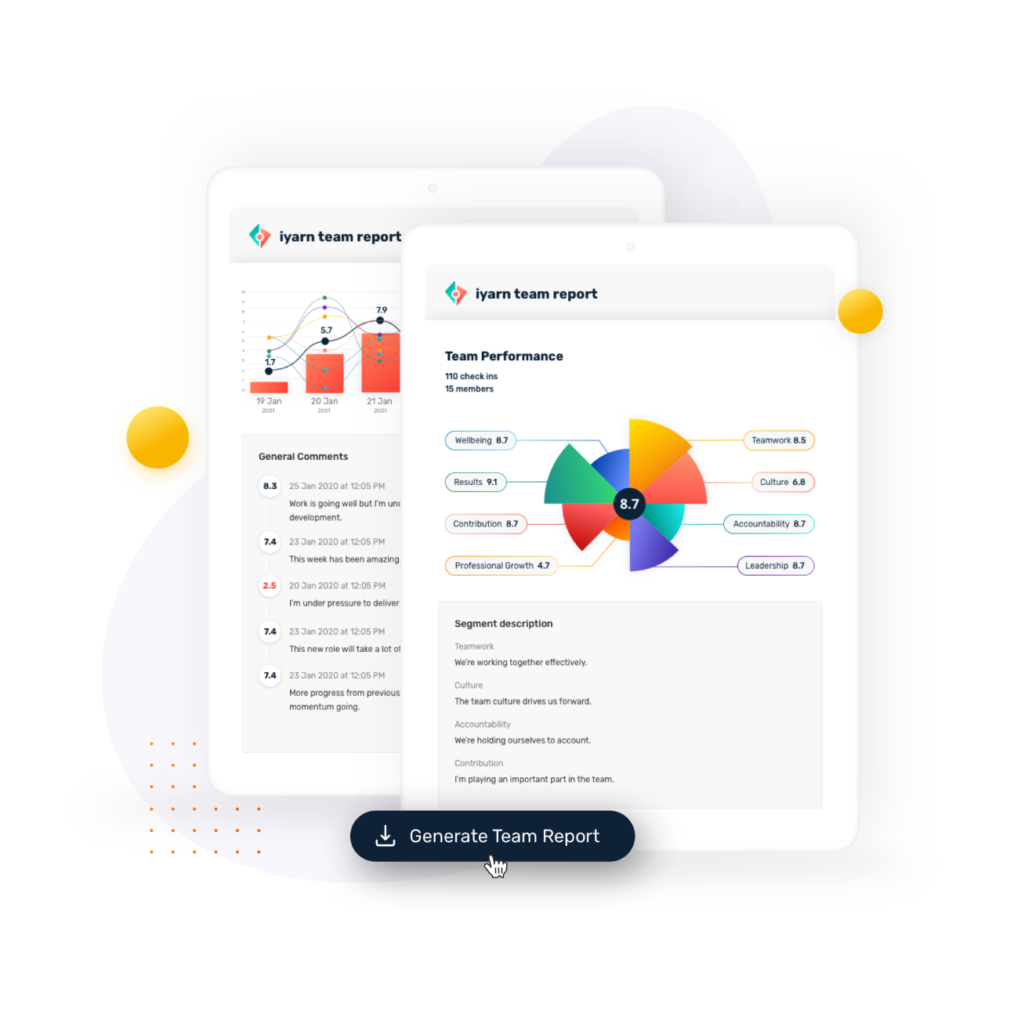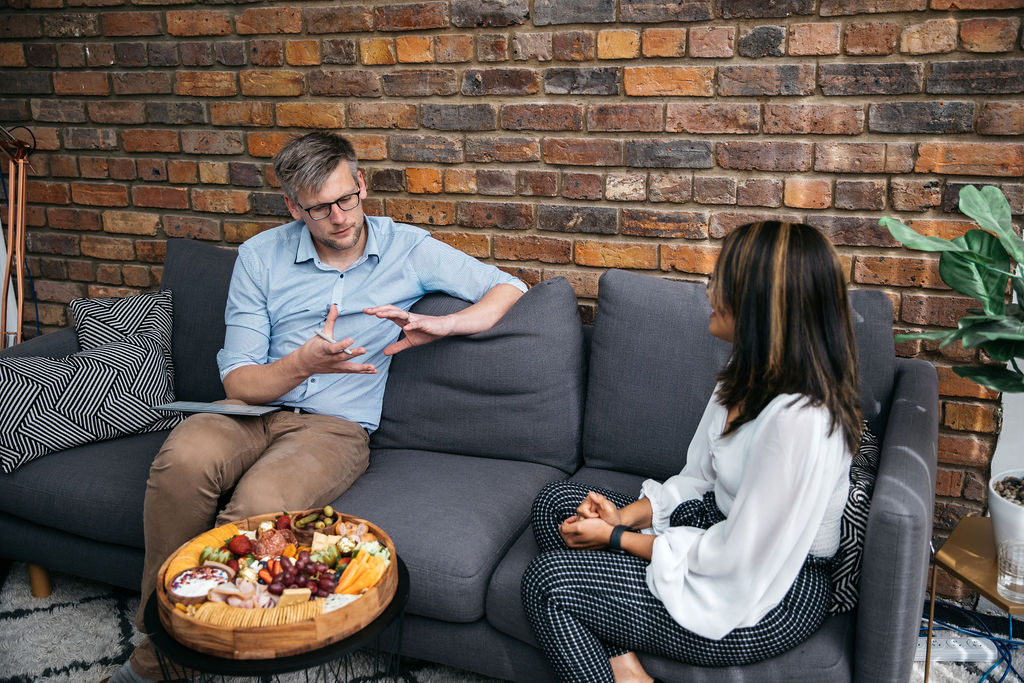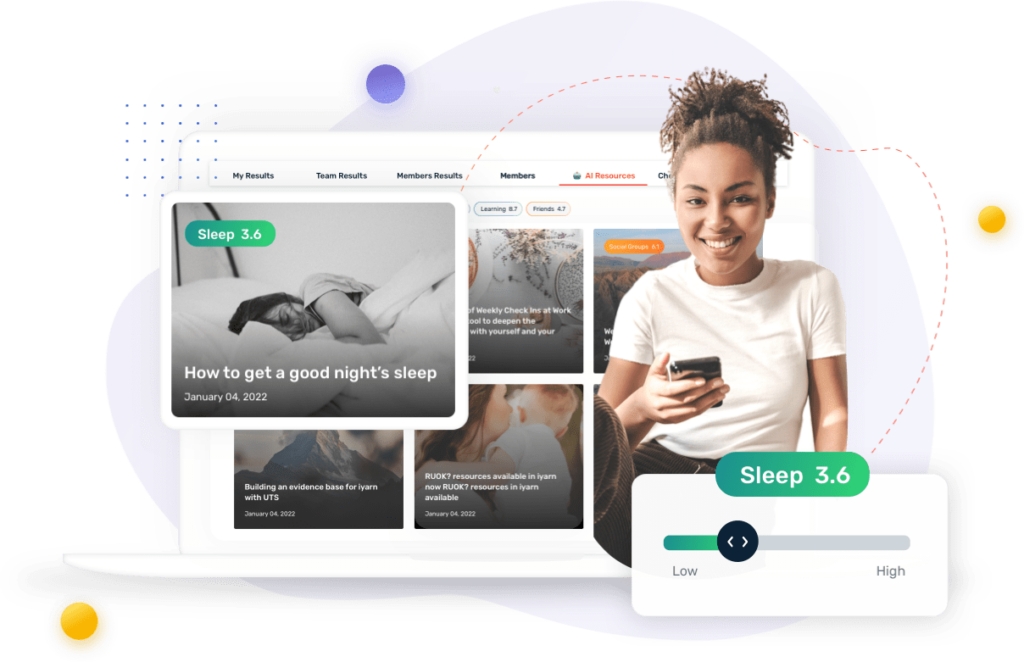iyarn Check Ins for Emerging Entrepreneurs: A Case Study with Adam Mostogl and the Van Diemen Project
Entrepreneurs have no easy task when it comes to building business and bringing their ideas to life. We caught up with Adam Mostogl, the CEO and Chief Entrepreneur of The Van Diemen Project, about how he’s checking in with entrepreneurs.
Adam’s approach shows how check ins are a great way to support entrepreneurs to develop their skills, in business and life.
Using iyarn at The Van Diemen Project
The Van Diemen Project offer support to communities and regions through events, advice and a co-working space in Launceston in Northern Tasmania, and empowers individuals through:
- Starting a new business
- Scaling an existing business
- Sustaining your business through contemporary business advice
- Supporting through events and workshops
In the last two years Van Diemen Project have had over 4,300 client meetings, and Adam has personally helped about 450 people in their start up journey in the last 12 months.
Integrating iyarn
Being in the entrepreneurial space, The Van Diemen Project want to check in with entrepreneurs about how they’re going, check in during events, but also check in internally with their team.
iyarn check-ins with the internal team
Internally, the iyarn platform is used as a diagnostic tool. Every single week before the weekly meeting everyone will get the notification on their devices to do an iyarn check in. The check in is used as a starting point to see where things are at and how the work is going. Everyone’s results are then displayed on the screen for everyone to see. Questions asked include:
- How are you feeling?
- Are you happy with where things are going?
- Are you anticipating the next week in a positive or negative way?
- Are you feeling stress and pressure?
Van Diemen have found this useful to understand how their team are feeling and what else is going on, not just in their work life but their personal life as well. They appreciate that this could be impacting the way a team member scores themself and want to help them as a whole person. Van Diemen have a created a supportive culture of treating people as people to help them with what’s going on rather than only focusing on getting the most out of staff while they’re at work.
Creating a safe space with iyarn
The Van Diemen Project team go through everyone’s results one by one, puts each person’s results against the question, and then asks them how they’re going so the team can then all support. If a team member isn’t feeling energised they are given the opportunity to express what’s happened to result in that score, then the team can collectively come up with all the different ways to support and ask ‘how do we help?, ‘how can we be there?’.
Using iyarn and giving the team a safe space to be open and honest has been really beneficial so they can support, encourage, give time and space to their staff when they need it.
iyarn check-ins with entrepreneurs
When checking in with the entrepreneurs, The Van Diemen Project lean more into mental health and wellbeing so they ask them about:
- Their social life;
- Their exercise;
- Their excitement in their idea;
- Their excitement about what’s coming next.
This enables The Van Diemen Project team to understand what could be the triggers or the stress points that could lead to entrepreneurs giving up on a good idea.
Plans for using iyarn over the next 12-24 months
Adam is currently one year into three years of work in the disability sector to help more people with disabilities start a business. Using iyarn has facilitated asking important questions to discuss and to chat, so people have a space to call out if they’re not doing so well and Van Diemen can support and encourage.
At The Van Diemen Project they feel it’s important to encourage the employees in the sector to be entrepreneurial and to think in innovative and creative ways so that they can advocate for participants to do the same, which gives more reasons to be using iyarn going ahead.
Using iyarn as a check-in platform but also a post-check-in platform allows Adam and the team to ask how participants are feeling six months down the track and whether they’re still getting [this] out of [this]. Adam can’t call them back into a room to ask how they’re going, but he does feel he can send them an email with a link for an iyarn check-in that’s simple and easy to use. Participants know an iyarn check in will take 30 seconds rather than a SurveyMonkey or Google Form that can be more time consuming, and still provide really useful data.
What is iyarn?
iyarn was created to help people connect on a person-to-person level by checking in. iyarn’s secure check ins are always fast and easily understood, clearly showing what is going well and perhaps not so well.
Each check in can be customised to capture the essential input. In the entrepreneurial environment, these check ins can be created to track professional growth, business progress, health, wellbeing, motivation and other important topics in a way that support the development of the entrepreneur. Check ins can be customised to understand where individuals are at any point during the program and boost personal and professional development.

iyarn: The App for Check Ins
We’ve built iyarn to help you check ins quickly and easily with your team members, whether they’re employees or colleagues who you’re mentoring.
Simply define what matters and share it to the people you need to check in with, it’s easy to get started. Check out our article on weekly check ins for help forming the habit of regularly checking in at work.
Use iyarn’s web app if you’re on a desktop or download the app from App Store (for iPhone) and Google Play (for Android)
We’re more than happy to provide a demo: send us a request or an email.

Want to learn more?
For more details about how iyarn was used at The Van Diemen Project and Illumuniate Education Australia, watch the full interview or check out the transcript below:
Transcript:
Lockie: Okay, Adam mate it’s great to have you here for the case study, thank you. I’m looking forward to asking you a few questions about iyarn and your experience to date. You know you’ve had an application for two different businesses you’ve used it for. Do you mind just giving us a bit of a quick summary around how it’s been useful for you and your crew?
Adam: Yeah so I’m Adam Mostogl and I work across a number of different organisations and we’ve integrated iyarn in two different ways with that.
So I am the founder and inspirer of Illuminate Education Australia we’ve taught now well over 15,000 students in schools all across the country on how to start their own business while they’re at school, but realising those skills that underpin that are the entrepreneurial skills, the soft skills, the things that young people need to go forward in their future, critical thinking, problem solving all of that. And as you could imagine we want to check on how students feel about: are they problem solving, are they getting that chance to innovate, to create, to believe in what they’re doing. We talk about confident, creative and capable young people. We want them to believe in themselves and we want to check in and ask them on how they’re going and how they’re progressing in that. And on average our group size in 2019, which is the last time we could be in schools on a regular basis, was 140 kids in a room. So to sit there and ask questions one-on-one with all of them it’s pretty hard. But iyarn has been fantastic for students to quickly get a QR code up on the screen, scan it with a device, and quickly check in with us, and then use it to reflect and to discuss. And so that’s the way that we’ve used it there, it’s been awesome.
And then I’m also the CEO and Chief Entrepreneur of The Van Diemen Project which offers business support and then helping people get their businesses started, growing, scaling, and also a lot of stuff in the community space based in Launceston in Northern Tasmania. Gosh we’ve had over what 4,300 client meetings in the last couple of years, I’ve personally helped about 450 people on their startup journey in the last 12 months. And so as you could imagine same sort of things you want to check in with people about how they’re going, but we also use it internally to check in with our staff. So every single week before our weekly team meeting everyone gets the notifications on their devices go and do your iyarn check-in, and we use that as a starting point before we talk about: where things are at, where the work is, we go ‘how are you feeling?’, ‘are you happy with where things are going?’, ‘are you anticipating the next week in a positive way or a negative way?’, ‘are you feeling stress and pressure?’, and it’s actually been a really great way to check in on how our team are feeling and what else is happening. Not just in their work life but in their personal life that is affecting the way they do, and how can we help them as a whole person rather than just, ‘well you’re here at this time, how do we get the most out of you?’. Actually realising that people are people and we want to help them with that, and we use iyarn in a whole heap of different areas as well. Like our event check-ins and everything else. But I’m really like, the stuff we do in the team space is awesome.
Lockie: Mate, Adam it’s great you know having someone like yourself who’s that willing to lean in and ask those questions because some of the things that come up with businesses you know with iyarn is like oh you know all of a sudden people feel they’re sharing a lot of personal information. So how do you create that safe space with that, with your staff to do those check-ins?
Adam: I think well, we probably don’t create the safe place that you’re thinking of because we then put it up on the screen and everyone looks at it. Everyone looks at their results every single week.
Lockie: And it’s a team aggregate or individual?
Adam: No, no, one on one we go through the list. We go through, we pull out each person’s results against the questions, and we ask them how they’re going because we can then all support. And so it’s actually, it’s a diagnostic tool for us to go ‘wait a minute, you aren’t feeling energised this week, what’s gone on? What’s actually happened?’ and they’ll sit there and go it’s either this or this, something’s happened. And then we can all sit there collectively with all of the different ways that we can support and go ‘how do we help?’, ‘how can we be there?’. So I think we probably do the opposite as like a complete open and honesty, but it works for our team and it’s been really great. And we’ve seen some people go through some really tough stuff and then sit there and actually be able to support them, and encourage them, and give them the space, the time, whatever we need to do to help them with that.
And so I think that’s been really good in the school space. We use the public wheel so it’s anonymous and so it’s really good, and we just put the results up for the students and it’s really interesting. I think the first one that we do the students are like ‘wait a minute, what is this?’. Quickly doing the check-in it’s great, but then once they see the results they can reflect on it. One example that I loved was a school with a group of year 9 students, about 180 odd. First day they put the results in, great yep what is this, let’s do that, and then the second day we got at the end of the day, we did the same check-in and we put the results up and some of them went down and then they argued with me because they said “no no those scores should have gone up” and I’m like “you put the data in”. So that was the thing, is actually we’re realising that what they were putting in actually had a response. And I think that’s the thing for me, it’s the quick check-in and then actually the visualisation of those results gives us a lot of information but actually sharing it gives a lot of power.
It’s to the point I’ve been doing some support in the disability sector and when the slide comes up with the QR code and I put the iyarn logo in the middle of it, everyone’s like “ah yes it’s time for iyarn and check in!” and it’s a really great time to then actually use those questions to discuss and to chat. I just find that I think if we ask for feedback people are willing to give it. We are often very afraid to do it and we’ve got to be open with the stuff that might not be great but like when someone says “I’m struggling I need some help”, like if your reaction is to say “okay I’m just going to leave you alone” like that’s not a human reaction. A human reaction is we come in, we support, we encourage, and so it’s more we’ve got a space that we can ask those questions because people can call out when they need it.
Lockie: And then so you know I love these stories and that way how you do engage with your students with the tool. Can you give us a bit of an insight around like, it could be inspire other people who are doing similar work, what kind of things are you checking on? Is it like the outcomes of the specific workshop you’re doing? Does it vary each time you do a check-in?
Adam: Yeah so, there’s a couple of questions that I sort of ask around, and so I often ask someone about how, I’m just thinking of the event ones that we do. We often ask them about have they found the support that they needed. So basically do they trust what we’ve delivered and do they believe can we support them in what they’re doing?
There’s when I’m doing multiple day workshops, I ask questions about anticipation. Are they anticipated and excited for what’s coming next because if they’re not anticipated something like if I’m doing a multi-day event and they’re not excited about coming back, I’ve got something we’ve got to work on. And so there’s that, asking them about their confidence and do they actually believe they can use this stuff? I ask a question about application: ‘can you use this again?’. Because we spent a lot of time building those skills and I don’t want to just be sitting in a room with someone going here’s the things that you need to do, and then they can’t translate it, or transfer, or apply it to another space. And so they’re some of the questions that I’m using it for from that business reflection perspective.
In students we’re asking about how stressed they might be feeling, how confident they’re feeling in a range of areas, and we have four core skill areas at Illuminate Education Australia. We talk to young people about communication skills so yeah communications, working smart, understanding, and of course I forget the fourth one which is problem solving. And so we actually asked them do they have the confidence in those four areas as well? and track that as it progresses as well. So we sort of use it where I’m really like if we’re going to do something we’ve got to do it well and we’ve got to track it. And so we use it in that.
And then our entrepreneurs check-in that we do starts to probably lean more into the mental health and well-being space and so we ask them about: their social life, their exercise, their excitement in their idea, and their excitement about what is coming next as well. And so we start to sort of lean more into that which could be the triggers and the stress points that actually could probably get them to reduce or to lighten the impact or kind of give up on an idea which actually is quite good.
Lockie: Awesome I love that and Adam you know I just want to acknowledge you also. You’ve been such a great supporter of iyarn you know you’ve been really leaning in and giving us that feedback and you know saying ‘oh would be great if we could have this or that and the other’ and you know it’s been great you know it goes back to this concept the MVP, right. So we were working with you for probably six months – eight months before you started really leaning in and did it. And it’s been great and then you’re like, you know it worked for you. You got to test the product, and then all of a sudden you’re like this is good enough for me to pay for it. And it’s been a great journey with you getting that feedback so you know with that in mind we’ve got a few things in the roadmap that would help you with the product, like I’d like to hear a bit more around how you’re looking at using it for the you know the next kind of 12-24 months?
Adam: Yeah I think obviously as we get back into schools face-to-face and being able to travel across the country it’ll only be more and more that we use it, and that’s the really great part. As we do more workshops, and run more sessions around the place, and expand our team as well. To do that we’re about to sort of build out with some of the organisations that already Illuminate has staff based in Melbourne and in Tasmania so like I haven’t seen them for a little while. And so to be able to do the iyarn check-ins and be able to know that very quickly get a notification and be able to check in and see how they’re going, and in a really unobtrusive way instead of picking up the phone and going ‘hey how was your week? What are you this and this, and I’m your boss I’m asking you?’ like getting rid of all of that. That’s really great from our perspective and I think it’s as it rolls out I’m often, I’m finding that I’m always one who loves to sort of get into things as their building and as they’re growing more to see how they’re shaping and growing and obviously some of the questions that I’ve asked of you have been it’d be really interesting how we use this.
Like we using the public wheels so anonymous check-ins on events but we want to share it amongst our team and those questions. And the thing is from my perspective as a business advisor, I ask questions of people all the time. And I know sometimes it’s just like ‘hey I’m just going to ask the question’ and I think that’s been really great watching that journey, and going wait a minute this is what we’re going to do and it’s like actually that’s so much better anyway like can we have that.
And then the other side of it you’ll send me an email and go “have you checked out this?” it’s like “yes this is amazing” and I think we actually just on our startup journey and our entrepreneurial journey we need those people that we can check in with, and ask questions, and just to go wait a minute is this working or not? And I think especially in that business context, to be able to have someone that can ask questions and support is really encouraging, and so that’s what I love to give and I’ve got definitely those people in my life. And so I think that’s been exciting for me in the iyarn journey.
I know you’ve asked me about where we’re going, I think it’s just we’re going to be in more schools, in more communities, running more workshops. I’m about to, I’m about one year into three years of work in the disability sector to help more people with disabilities start businesses. But also actually encouraging the employees in the sector to be entrepreneurial because if they’re not thinking about starting businesses and being innovative and creative, how can they then advocate for participants to do the same? And that’s only going to give us more reasons to be using iyarn as a check-in platform and actually as a post-check-in to go ‘how are you feeling afterwards?’, ‘how are you feeling six months down the track?’, ‘are you still getting this out of this?’, and like I can’t call them back into a room all the time, but I can find them an email and they can do a check-in and click on a link. And that’s what, that’s the stuff that it’s just so quick and easy to use. It just means that sort of stuff, it’s you get a surveymonkey link, you get another google form, you just go ‘yeah cool’ but you get an iyarn link it’s like ‘it’ll take me 30 seconds, this will be great’ and the data is just as good and it’s actually really useful.
Lockie: Awesome mate, well Adam it’s been great working with you and I’m looking forward to continue that journey over the next 12-24 months and ahead so thank you.




